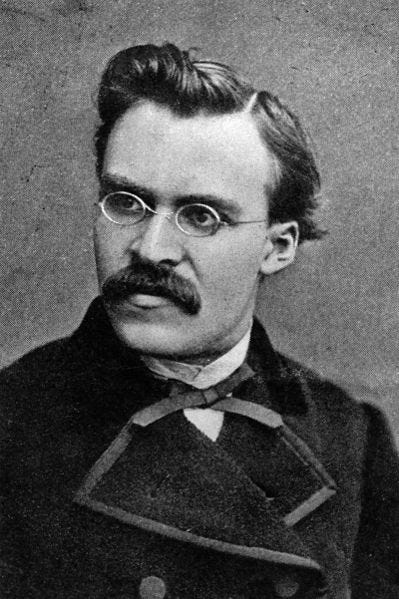Natural, Willing Slaves
“That some should rule and others be ruled is a thing not only necessary, but expedient; from the hour of their birth, some are marked out for subjection, others for rule.” – Aristotle
It is hardly much of a revelation to say that the modern American Left – a group comprised of college-aged infants and men convinced they can menstruate, “democratic socialists” and quadrupled-jabbed believers in science – is a movement riddled with inconsistencies and rife with contradiction.
The Starbucks Marxist is perhaps the most meme-worthy example. Tweeting out furious anti-capitalist talking points from behind their slave-assembled iPhone (laptop stickers proclaiming ‘give peace a chance’ alongside support for NATO’s ongoing proxy war in Ukraine) these latte-sipping paradoxes are an exasperating but ultimately benign embodiment of the hypocrisy which has come to define the progressive worldview. More troubling still are the mobs of media-mobilized rioters who spent 2020 torching black neighborhoods in the name of racial justice, or the self-styled anarchists conscripted to enforced Big Pharma diktats. Hell, even these pale in comparison to the emissions-obsessed eco-alarmists boarding private jets to their latest rendezvous in Davos, and yet for observers of a more academic persuasion, even this behavior can be explained, far from an expression of mere ideological incoherence, by a complex and deeply-engrained psychological phenomenon first articulated by one Mister Friedrich Nietzsche.
Theory of Master-Slave Morality
Before delving into the specifics of Nietzsche’s competing ethical frameworks, it is first necessary to understand where he believed these originated. As illustrated by his most famous (and often misapplied) quote “God is Dead,” the notoriously arcane philosopher was dispensing, at least in part, with the idea of objective truth, the rightness or wrongness of an action dependent not from any telelogical laws, but rather the innate human desire to exert oneself on their surroundings – a drive which Nietzsche dubbed "The Will to Power.”
For the strongest within society - a group he variously refers to as “Nobles”, “The Higher Man”, and the Übermensch - this is pretty straight-forward. Writing in his seminal work On the Genealogy of Morals, the author outlines how this princely class, in possessing both the vision and resolve to pursue their goals, will come to define “good” and “bad” based wholly on whether these are facilitated or impeded. But this is not some callous megalomania. In viewing themselves beneath the gaze of eternity (as opposed to the fickle judgement of their peers), the Übermensch is guided not by fleeting externalities or transient social norms, but by his own self-determined notion of personal excellence - courage, integrity, trustworthiness, but above all nobility the virtues most highly prized by adherents of Nietzsche’s “Master Morality.”
Slave morality, on the other hand, is the morality of the herd, the unexceptional masses - a direct response to and complete inversion of, that of the Higher Man. This reaction, Nietzsche believed, could be traced all the way back to Rome’s five-hundred year occupation of Judea, when the wrongs inflicted by the colonizers were to provoke the emergence of a whole new ethical paradigm, as the native population sought to reclaim some semblance of power via the influence of religion. For Jews, this would manifest in a doctrine which emphasized survival and ethnic cohesion, martyrdom and the accrual of wealth, while for Christians, veneration of the down-trodden and charity toward one’s neighbors became the central-most tenants of their faith. Nevertheless, according to Nietzsche, both ideologies retained at least two common features: the comforting lie of the afterlife as well as an abject disdain for the powerful. Or as he put it:
“The revolt of the slaves in morals begins in the very principle of resentment becoming creative and giving birth to values—a resentment experienced by creatures who, deprived as they are of the proper outlet of action, are forced to find their compensation in an imaginary revenge. While every aristocratic morality springs from a triumphant affirmation of its own demands, the slave morality says ‘no’ from the very outset to what is ‘outside itself,’ ‘different from itself,’ and ‘not itself’: and this ‘no’ is its creative deed.”
The Power of Ressentiment
Although first popularized by Danish theologian Søren Kierkegaard (who employed it to denote a state of spiritual stasis) the term ressentiment has since been embraced by a host of both psychologists and philosophers in order to describe every iteration of bitterness imaginable. Today, however, it is undoubtedly Nietzsche’s usage which remains the most widely understood.
Kept in the original French so as to convey the full acerbity of its intent, the renowned German thinker adopted ressentiment as a label for the hostility harbored by followers of slave morality toward their loftier counterparts, projecting onto the Übermensch all blame for their own failures and frustrations. Back in Judea, this animosity grew to such heights that it would ultimately overthrow the aristocratic value system established by the Romans, the once lauded characteristics of virility and self-mastery now derided as tyrannical, egocentric, and indifferent to the suffering of others. But far from some kind of moral renaissance – a coup d'éthique, if you will – in reality, this overhaul was driven solely and exclusively by the need for self-preservation, a defense mechanism which the embittered placed between themselves and their own towering deficiencies. As Nietzsche explains:
“How much reverence has a noble man for his enemies! - and such reverence is a bridge to love. - For he desires his enemy for himself, as his mark of distinction; he can endure no other enemy than one in whom there is nothing to despise and very much to honor! In contrast to this, picture ‘the enemy’ as the man of ressentiment conceives him - and here precisely is his deed, his creation: he has conceived ‘the evil enemy,’ ‘the Evil One,’ and this in fact is his basic concept, from which he then evolves, as an afterthought and pendant, a ‘good one’ - himself!”
Ressentiment and the Left
And there scarcely can have been few times in history when this impotence-inspired envy has been more tangible than today. After all, one need not bow to the Nietzschean premise that principles stem uniquely from the minds of men in order to also acknowledge the immense prescience of his observations - the modern American left exhibiting, to a degree which must surely surpass the citizens of Judea, all the ressentiment and subsequent symptoms of slave morality the philosopher so astutely observed .
Examples are almost too abundant to mention. After all, it seems safe to assume that the reader has by now found themselves, typically for an infraction no greater than quoting black-on-black crime statistics or a particular passage from Ashley Biden’s diary, met with the accusation of “sexist,” “racist,” or another of the left’s cartoonishly tiresome epithets. Even these are comparatively genteel. Indeed, one need only head over to Twitter, Facebook, or God forbid, Reddit in order to see the undisguised contempt which festers in the minds of society’s most ethically-enfeebled – a contempt which, with each new MSM propaganda campaign, is liable to burst forth in an orgy of violence, vindictiveness, and hysterical, establishment-abetting venom. That these people call themselves progressives is laughable. If progress was even close to their intent then they would not so gleefully deride the values which might enable it - the left’s tradition of cultural vandalism and behavioral sabotage nothing more than a brazen attempt to pull the rest of us down to their level of intellectual, artistic, and moral mediocrity.
The Triumph of the Slave
A reoccurring concern throughout Nietzsche’s work is that civilization, populated so disproportionately by these individuals, would soon become inhospitable to the Higher Man and his pursuit of excellence. As such, it was to this proud but persecuted minority whom he addressed his writings, warning stridently against the lure of slave morality and urging readers to instead chart their most autonomous and thus, heroic path through life. But Nietzsche was far from optimistic:
“Let us face facts: the people have triumphed — or the slaves, the mob, the herd or what ever you like to call them ... Masters have been abolished; the morals of the common man have triumphed... Mankind’s ‘redemption’ (namely from its masters) is well under way; everything is becoming visibly Judified or Christified or mobified (what do words matter!). To arrest this poison’s progress throughout the body of mankind seems impossible...”
It is difficult not to draw much the same conclusion. Three years after the COVID hoax elevated submissive conformity to society’s most supreme virtue, the western world has continued along its downward trajectory even more rapidly and in a manner far more servile than any Nietzsche must ever have envisaged.
Victimhood has long been a prized commodity.
Purpose, strength, and direction, are increasingly seen as questionable traits if not full-blown cardinal sins, while little by little, in institution after institution, the standards which once provided civilization its structure are being sacrificed at the recently erected alter of equity and inclusion. On the face of it, the numbers advocating this warped, anti-human agenda seem irrepressible. Given wokeness’ capture of virtually all of America’s most foundational pillars, there is no denying the force we are up against. But no matter whether it is betrayed by the rhetoric of some deranged Starbucks Marxist or the nervous smirk of Don Lemon, whether evident in the dead-eyed gaze of a gender-fluid public school teacher or the quivering hands of Anthony Fauci, the Higher Man must take heart in knowing that inside the chest of all who oppose him beats the heart of a natural, willing slave.
Crypto Donations:
Bitcoin: 1MHzr38VAc3g5cucBGiT8axXkiamSAkEkZ
Ethereum: 0x9c79B04e56Ef1B85f148CaD9F4dBD4285b2f9E69









Excellent essay. Nietzsche is so misunderstood.
Thank You Carson.
Slaves of self victimhood.